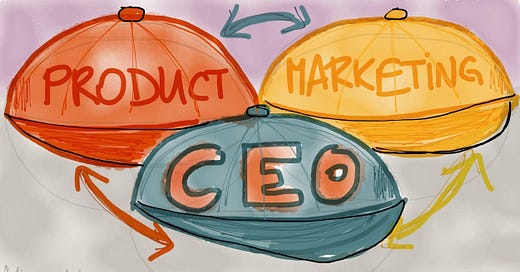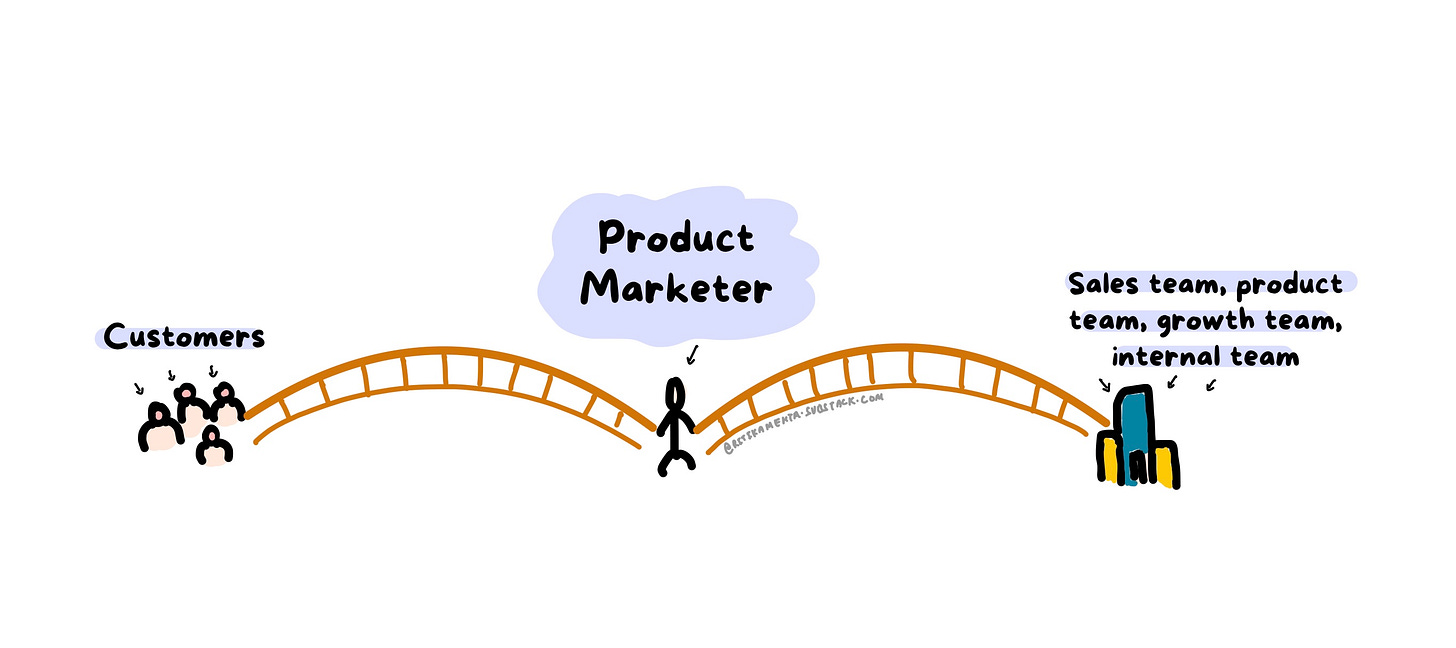Founder’s guide to Product Marketing: Startup to Unicorn
For any stage founder, MVP to startup to unicorn, product marketing is something you'll have to start from day one ideation - here's all about it's why, when & who's.
Hi 👋, Welcome to the 48th newsletter post.
The real challenge isn’t how you build the technology of your product but how you find your share in the market and sustain the turbulence.
Imagine this scenario:
Gets a really amazing idea → talk to potential customer to validate the problem → starts building the solution → work on marketing → zero show ups → thinks there is some problem with the product or idea → Pivot
I have seen so many founders (and myself in past) do this. They get lost in working behind the scenes that they forget how to ship the boat to the sea.
However, we are in a time where the potential customer is all distracted and things can change fast before they even get used to it. If you’ve seen how trends come and go since 2020, it wouldn’t be a surprise to say - sustaining in the industry is a different thing but entering into one has become more difficult.
Ready to ship the idea is only half the battle won, the other half is marketing. Even if you somehow managed to build a product & get initial customers without marketing, scaling is something you’ll have to wander around. Companies and founders fail to recognise how product marketing can connect the dots between the product and the market.
So here’s a little guide that can help you kick-start product marketing from day one.
Remember: this isn’t only for SaaS products but works for any type of startup in any industry. In fact, being aware of the small details present in this guide will help you tackle investors’ questions. And if you need more help, you can always reach out to me :).
But first a quick shoutout.
Dan’s Dispatch
Subscribe to Dan's Dispatch for insights to help you reach your full potential. Get actionable frameworks and practical advice to help you discover and do your best work. Join 900+ readers every month.
Product marketing vs growth marketing
In a lot of scenes, founders tend to hire growth marketers first. But is it what you should do?
If I give you a little glimpse of the product marketing role, I would say - product marketers translate and communicate between customers and product teams (or the product overall).
“They are also responsible for becoming familiar with customers, building different customer personas, positioning, competitive intelligence, and creating programs to help the company introduce the product to the right target audience in the right market. Along with being responsible for communicating the product benefits to prospective customers, the industry (analysts and executives), and to the world in general.”
Most new B2B startups scout for growth marketers at a very early stage, which makes it a highly misunderstood role. If you don’t understand how your tactics fit into the larger marketing strategy with the product, industry and sales, it's not going to give you desired results.
When you’re starting a company it doesn’t mean you should waste a lot of money on-demand generation and paid ads.
Demand generation and growth marketing are extremely important, but they are often hired too soon before a company truly understands how to position the product and frame its message to their customers.
That being said, your first marketing hire should be a product marketer.
Where to begin with
Now, let’s be real, any product or service you see around or it catches your attention, it has great marketing done by the team. I haven’t encountered any single product that hasn’t done marketing & I liked it.
Even if you missed out on marketing at the ideation stage, you have to still somewhere lay the foundation. Start by answering these questions:
What is the vision - story around your brand?
Who will buy or use the product - ideal market audience or buyer persona.
How will you catch the audience's attention and convince them to buy your product?
What channel will you reach to your potential customer?
What is the ultimate satisfaction and value does the product give the customers?
Founder’s plan for product marketing
Every founder needs to have the additional skill of marketing (in my sense) because, at the early stage, only the founder can communicate the vision by turning it into a story that customers can relate to, no matter what business they are in. They need to do marketing until the startup is at the growth stage and someone can oversee it on their behalf. Or they should completely be involved in marketing activities done by a product marketer.
If you’re starting it out here’s some quick things to consider.
Interact with your customers
At many companies such as Uber, DoorDash, Intercom, etc. founders or executives spend once a month helping the customer support team or actually going through the sales process - delivering items. This helps them stay updated with market-based evidence and get in touch with what customers want and need. Also, the more you as a founder connect with the customer, the more comfortable they feel buying from you.
Your marketing strategy will help navigate the product-building process by understanding the customers, not only that but it will give you insights on:
What pricing method works for them & how much they are willing to pay (check out which pricing strategy you should go with).
In what way, tone and means you should communicate with the customers - also by understanding their problem first.
Define your product positioning and messaging
Product marketing strategy helps with how to enter the market with your product and how you’ll position it to your target customers as well as how you’ll communicate. In simple words:
Positioning - How you want to position yourself in the market. A good positioning attracts the right buyers who won’t leave after signing up. Along with creating the overall product marketing strategy: what story to narrate, what voice to use, and what point of view to set.
Messaging - Once you’re done with defining your position in the market, this will help the company develop its own story and messaging which is authentic to stand strong and resonate with potential buyers.
Go-to-market strategy
No matter whatever stage you are at or if you haven’t reached the product-market fit yet, you need to have a starter pack for go-to-market strategy. Having an initial GTM strategy shows you your ideal customer, what acquisition levers to pull, and how you’ll grow over time. Something like how to get your first 1000 high-quality customers or a promotional campaign.
The best way to start is by connecting the dots backwards - how users use the product, what value they get, how they land on your website and how they even find you.
Label as many steps as possible in a customer journey, this will give you an idea of where to start, how to approach, where is the leakage and what potentially your customers might be thinking.
Tracking the success of product marketing
A product isn’t a success if you only tick off the planning work. To define the success of product marketing it’s important to see how much your strategy and planning has impacted the product growth. I try to classify metrics in two ways: exciting numbers and numbers that bring impact. One pushes you to keep going and the other helps you reach your overall growth.
As much as numbers are great motivators and bring a sense of accomplishment and excitement, they won’t help measure the impact it has on your product and necessarily won’t be aligned with the overall company goals.
Last but not least
Remember this is just the tip of the iceberg there’s a lot more in product marketing. Every company create its own framework that works for them best. So think a lot before blindly following what an established business is doing.
Were you a founder who struggled with marketing?
Until next time,
Ritika
👋 PS: I’m Ritika founder, product marketer and advisor for early-stage to unicorn startups, work with me or connect with me here. If you’re a first-time founder looking for curated resources, download here. You can also promote your product in this newsletter or share your feedback or questions here.
Thank you for being a consistent reader of this newsletter, it wouldn’t have reached here without your support. 🤗







I'm happy to see how much effort you have put it to the research.